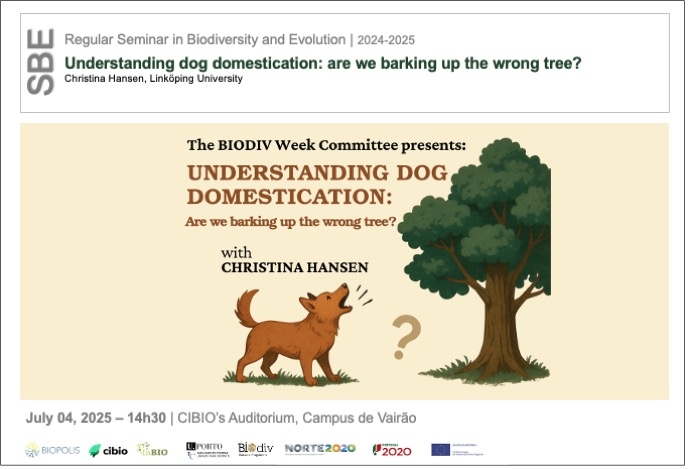Understanding dog domestication: are we barking up the wrong tree?
04 Jul 2025 - Christina Hansen, Linköping University | 14h30 | CIBIO’s Auditorium, Campus de Vairão

REGULAR SEMINAR IN BIODIVERSITY AND EVOLUTION
Animal domestication provides an extraordinary framework to study evolution. As an example, domestication is hypothesized to drive correlated responses in animal morphology, physiology and behaviour, a phenomenon known as the domestication syndrome. However, the expectation that traits within the domestication syndrome are actually correlated lacks quantitative confirmation. Upon testing this commonly applied paradigm in domestication research using standardized behavioural and morphological data from more than 76,000 purebred dogs, we found limited support for the domestication syndrome hypothesis. Another popular domestication hypothesis posits that dogs have evolved unique abilities to interpret social-communicative behaviour expressed by humans post-domestication. This behaviour is thus not expected to occur in wolves. However, when testing 8-weeks old naïve wolf puppies, we found that some wolves spontaneously responded to social-communicative behaviours from an unfamiliar person by retrieving a ball. This suggests that, a) behavioural responses to human social-communicative cues are not unique to dogs, and b) although probably rare, standing variation in the expression of human-directed behaviour in ancestral wolf populations could have been an important target for early selective pressures exerted during dog domestication. In sum, the results from these studies highlight how untested paradigms and general misconceptions can hinder our adequate understanding of evolutionary processes within a domestication framework.
Christina Hansen Wheat is a behavioral ecologist at Linköping University, with a central focus on how behavior develops and evolves over time. Her research is grounded in Tinbergen’s Four Questions (causation, ontogeny, adaptation, and evolution) and explores how behavioral traits are shaped by factors such as social environment, physiology, climate, and habitat. She applies an integrative and comparative approach, often combining behavioral experiments with ecological, physiological, and developmental perspectives. Collaborative research, both in Sweden and internationally, is a key part of her scientific practice. Over the years, she has worked with a broad range of species, including swift foxes, leopards, and birds. Her current research centres on domestic dogs and their closest wild relative, the grey wolf, using this model system to investigate questions related to behavioural ecology, behavioural ontogeny, and the process of domestication.
[Host: BIODIV Week Committee]